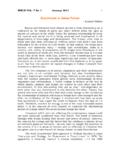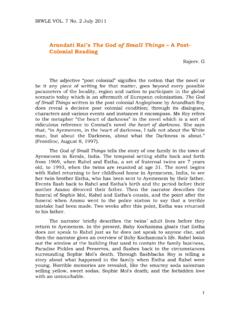Transcription of Silence! The Court is in Session: The Quintessence of ...
1 The Indian Review of World Literature in English, Vol. 5 July, 2009 [1] Silence! The Court is in Session: The Quintessence of gender discrimination Megha Trivedi Vijay Tendulkar is one of the outstanding Indian Playwrights. He has mastered different genres of literature like Essays, Short Stories, Criticism, Screenplay Writing and Drama. He is known for his plays, Shantata! Court Chaule Ahe (1967), Gh shir m Kotw l (1972), and Sakh r m Binder (1972). He has received awards including the Padma Bhushan, Sangeet Natak Akademi Award, Filmfare Award, Saraswati Samman, Kalidas Samman and Maharashtra Gaurav Puraskar. He is ranked with great playwrights like Badal Sarcar, Girish Karnad and Mohan Rakesh. In the preface to his collection of Six One Act Plays Raatra (night) , he has mentioned: Recently, my name has been repeatedly counted amongst the followers of the new drama sect.
2 I have felt no great urge thus, far to determine which sect I belong to, nor do I expect to feel the need to do so in the future. I have written on any theme that has occupied my mind over time, stubbornly insisting that I write on in which ever form I thought is wrong to support that everything different from the establishment is bad, childish and irrelevant. It is equally wrong to think that only which is different is good, true or valuable. Personally, despite being counted amongst the new dramatist, I love to lose myself in the best of Deval, Gadkari, Khadikar and (Tendulkar 197) Vijay Tendulkar has powerfully articulated the socio-political situations in his plays. He has expressed it by saying: As an Individual or rather as a social being, I feel deeply involved in the existing state of my society (because I am affected by it though not immediately in some cases or not as much as some others are) and in my way brood over it.
3 Once in a way I even do something to relieve myself of the tension and anxiety and agitation produced by this brooding. I participated in a protest meeting or dharma or a fast or morcha or a satyagragh I align myself with some civil liberty As a writer, I find myself persistently inquisitive, non conformist, ruthless, cold and brutal as compared to the other committed and human .. The Indian Review of World Literature in English, Vol. 5 July, 2009 [2] As a social being, I am against all exploitation and I passionately feel that all exploitation must As a writer, I feel fascinated by the violent exploiter and exploited relationship and obsessively delve deep into it instead of taking a position against it. That takes me to a point where I feel that the relationship is external fact of life however cruel, will never end.
4 Not that, I relish this thought while it grips me but I cannot shake it off. (Tendulkar 92) In Silence! The Court is in Session, Tendulkar has depicted the difficulty of a young woman, who is a victim of the male dominated society. Tendulkar has criticized the follies prevailing in the society. The original name of the drama in Marathi is Shatata! Court Chaule Ahe (1967). It was translated in English by Priya Adarkar. The play carries all the vitalities of contemporary life. It focuses on the human mind and detects the ugliness in it. All the plays of Tendulkar are the result of his surveillance of the life, society and different incidents of his own life He has noted in an interview that: I personally don t bother about people who haven t seen life. They close their eyes at the sight of suffering as if it doesn t exist.
5 The fact is that life is dark and cruel, its just that you don t care for the truth. You don t want to see it because it might make you uncomfortable. If escapism is your way of living then you will fail to see the truth. I have not written about hypothetical pain or created an imaginary world of sorrow. I am from a middle class family and I have seen the brutal ways of life by keeping my eyes open. My work has come from within .. an outcome of my observation of the world in which I live. If they want to entertain and make merry, fine go ahead, but I can t do it, I have to speak the truth. Miss Leela Benare is presented as an extraordinary and crucial character in the play. She is a young middle class woman of 34 years who is working as a teacher to earn her livelihood.
6 She was loved and appreciated by her students in the school. She was punctual in coming to the school every morning, carrying out her assignments and her courses. Ms. Benare said to Samant: I never had been behind with my lesson! Exercises corrected on time too, not a bit of room for disapproval, I don t give an inch of it to anyone! ( 4) She admits to Samant, a local villager who escorts the amateur dramatic troupe members to the village hall, that little children are much better than the adults. She said: The Indian Review of World Literature in English, Vol. 5 July, 2009 [3] They don t have the blind pride of thinking they know everything. There is no nonsense stuffed in their heads. They don t scratch you till you bleed, then run away like cowards. ( ) She was a member of an Amateur Theater group.
7 They arrived in a village to perform an awareness raising play on the social and current issues. Ms. Benare was preparing to present a play titled Mock Trial of Lyndon B. Johnson at Suburban Village. She was accompanied by Samant and was enjoying his company. She admits it to him that: I felt even more wonderful coming here with you. I am so glad the others fell behind . ( 1) She introduces all her co- stars to samant in their absence. She sarcastically calls Mr. Kashikar as Mr. Prime Objective Mrs. Kashikar as Mrs. Hands that Rocks the cradle She further says that the Hands that Rocks the cradle has no cradle to rock. ( ) Mr. and Mrs. Kashikar were childless and had adopted Balu. According to Benare, they have made him slave: Mr.
8 Kashikar and the hands that Rocks the cradle, in order that nothing should happen to either of them in their bare house and that they shouldn t die of boredom, gave shelter to a young boy. They educated him- made a slave out of him ( 6) She sarcastically introduced Sukhatme, one of her co-stars as: An expert on the law. He s such an authority on the subject; even a desperate client won t go any where near him! He just sits alone in the barristers room at a Court , swatting flies with legal precedents! (Silence ..6) According to Ms. Benare, Ponkshe is Scientist, Inter failed . ( 6) She called Prof. Damle as: And we have an intellectual too. That means someone who prides himself on his books learning. But when there is a real life problem, away he runs, hides his head.
9 He s not here today. Won t be coming either. He won t dare. ( ) Benare wanted to live a free life, free from the patriarchal dominance and the conservative norms of the society. She displays self-determination, self -assertiveness and cynicism but is also receptive to the conventional norms of integrity. Tendulkar has tried to initiate the new form by commenting on the mendacity of the social and ethical standards existing in the society. The below conversation between Benare and Samant throws light on the character of Benare. The Indian Review of World Literature in English, Vol. 5 July, 2009 [4] Benare: I am the soul of seriousness: But I don t see why one should go around all the time with the long we should laugh, we should play, we should sing!
10 If we can and if they will let us, we should dance too! Should not have any false modesty or dignity or care for anyone! I mean it. When your life is over, do you think anyone will give a bit of theirs? What do you say, Samant? Do you think they will? Samant: You are quite right. The great sage Tukaram at least I think it was Benare: Forget about the sage Tukaram. I say it-I, Leela Benare, a living woman, I say it from my own experience. Life is not meant for anyone else. It s your own life. It must be. It is a very very important thing. Every moment, every bit of it is ( ) The actual play was scheduled to be staged in the night. Character wanted to rehears the drama, a mock trial and also found it as an opportunity to dig up Leela s past life. Balu Rokde, Ponkshe, Karik and Samant appeared as witness for the trial against Benare.


